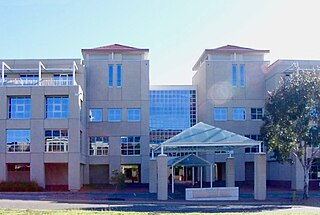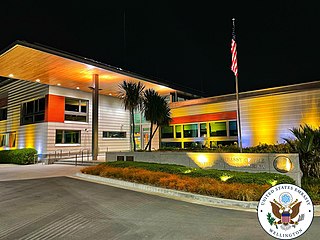
Fiji has experienced many coups recently, in 1987, 2000, and 2006. Fiji has been suspended various times from the Commonwealth of Nations, a grouping of mostly former British colonies. It was readmitted to the Commonwealth in December 2001, following the parliamentary election held to restore democracy in September that year, and has been suspended again because of the 2006 coup, but has been readmitted a second time after the 2014 election. Other Pacific Island governments have generally been sympathetic to Fiji's internal political problems and have declined to take public positions.

The foreign relations of New Zealand are oriented chiefly toward developed democratic nations and emerging Pacific Island economies. Until the late 20th century, New Zealand aligned itself strongly with the United Kingdom and had few bilateral relationships with other countries. From the latter half of the 20th century, Australia has been New Zealand's most important cultural, economic and military partner. Today, the country participates in several multilateral political organisations, including Asia-Pacific Economic Cooperation, the Pacific Community, and the Pacific Islands Forum. New Zealand has been described as an emerging power; however, such a claim needs to be considered in the context of its medium-sized economy and limited military capability. The country's major political parties have generally agreed on the broad outlines of foreign policy, and the government has been active in promoting free trade, nuclear disarmament, and arms control.

Foreign relations of Australia are influenced by its position as a leading trading nation and as a significant donor of humanitarian aid. Australia's foreign policy is guided by a commitment to multilateralism and regionalism, as well as to build strong bilateral relations with its allies. Key concerns include free trade, terrorism, refugees, economic co-operation with Asia and stability in the Indo-Pacific. Australia is active in the United Nations and the Commonwealth of Nations. Given its history of starting and supporting important regional and global initiatives, it has been described as a regional middle power par excellence.
From 1916 to 1975, Tuvalu was part of the Gilbert and Ellice Islands colony of the United Kingdom. A referendum was held in 1974 to determine whether the Gilbert Islands and Ellice Islands should each have their own administration. As a consequence of the referendum, the separate British colonies of Kiribati and Tuvalu were formed. Tuvalu became fully independent as a sovereign state within the Commonwealth on 1 October 1978. On 5 September 2000, Tuvalu became the 189th member of the United Nations.

Tonga, by a modification of its treaty of friendship with the United Kingdom in July 1970, is responsible for its own external affairs. It maintains cordial relations with most countries and has close relations with its Pacific neighbours and the United Kingdom. In 1998, it recognized the People's Republic of China and broke relations with Taiwan.

The Tripartite Convention of 1899 concluded the Second Samoan Civil War, resulting in the formal partition of the Samoan archipelago into a German colony and a United States territory.
The Cook Islands maintains diplomatic relations with various countries and is a member of multilateral organisations. While the country is in free association with New Zealand, which can act on the Cook Islands' "delegated authority [...] to assist the Cooks Islands" in foreign affairs, the Cook Islands nevertheless enters into treaty obligations and otherwise "interacts with the international community as a sovereign and independent state."
Niue maintains diplomatic relations with various other countries and multilateral organizations.

The Embassy of the United States in Wellington is the diplomatic mission of the United States of America in New Zealand. The United States had consular representation in Wellington from 1868 and since 1922, the consul-general relocated from Auckland to the country's capital, Wellington. The United States recognized New Zealand's independent status in 1942 and in the same year, a legation was established in Wellington. In 1948, the transition from legation to embassy occurred. After leasing various offices for decades, the United States had a purpose-built embassy established in Thorndon in 1977; this remains the current embassy building.

David Huebner is an international arbitrator based in Southern California. He previously served as the United States Ambassador to New Zealand and Samoa. He was the first openly gay ambassador in the Obama administration and the third openly gay ambassador in United States history. His tenure was marked by significant improvement in bilateral relations, with commentators observing that relations are stronger and closer than they have been in decades. Called an “excellent public face for the United States,” he has been widely praised as a successful Ambassador including for his accessible, inclusive approach, his emphasis on students and future leaders, and the innovative restructuring of his Embassies around social media and other nontraditional tools and approaches of diplomacy. Before being appointed Ambassador he worked as an international lawyer in Los Angeles, Shanghai, and New York City, specializing in international arbitration and mediation. He is licensed as an attorney in California, New York, and in the District of Columbia, and as a solicitor in England and Wales.

The political status of the Cook Islands and Niue is formally defined as being states in free association within the Realm of New Zealand, which is made up of the Cook Islands, Niue, and New Zealand and its territories, Tokelau and the Ross Dependency. The Cook Islands and Niue have full constitutional independence from New Zealand and act as independent countries. Some countries have recognised them as sovereign entities and established diplomatic relations. However, New Zealand may carry out defence and foreign affairs on behalf of the two associated states when requested.
The Embassy of Switzerland in New Zealand is the official representation of Switzerland in New Zealand and in a number of Pacific island countries.

The United States Embassy in Poland is situated on Ujazdów Avenue in Warsaw, Poland. The United States also maintains a consulate in Kraków.

Israel–Samoa relations are bilateral ties between the State of Israel and the Independent State of Samoa. Israel is accredited to Samoa from its embassy in Wellington, New Zealand. Samoa has an honorary consul in Israel, resides in Ness Ziona.

The importance of the relations between Germany and New Zealand centers on the history of German migration to New Zealand. Approximately 200,000 New Zealanders are of German descent, and many German tourists visit New Zealand each year. Both nations are members of the Australia Group, Organisation for Economic Co-operation and Development and the United Nations.
The Embassy of the United States in Suva is the diplomatic mission of the United States of America in Fiji. It also provides services to the countries of Kiribati, Nauru, Tuvalu, and Tonga. The embassy is actively involved in various areas including environmental and development cooperation, as well as contributing to international peacekeeping efforts.












